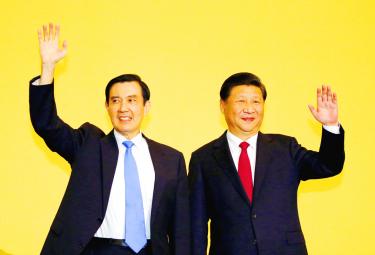Democratic Progressive Party (DPP) lawmakers yesterday called for an investigation into allegations that former president Ma Ying-jeou’s (馬英九) administration did not hand over all confidential information on his 2015 meeting with Chinese President Xi Jinping (習近平) to President Tsai Ing-wen’s (蔡英文) administration.
Ma and Xi met in Singapore on Nov. 7, 2015, the first time the leaders of Taiwan and China had met.
A report published yesterday by the Chinese-language Liberty Times (the Taipei Times’ sister newspaper) alleged the Ma administration did not turn over key documents detailing how the meeting was negotiated.
The public was kept in the dark about a proposed Ma-Xi meeting until the Liberty Times reported on it on Nov. 3, 2015, one day before the Presidential Office held an international news conference to announce the summit.
Yesterday’s Liberty Times report quoted an anonymous high-level official in the Tsai administration as saying that there are no documents showing how Taipei and Beijing interacted, or how they made arrangements for the summit.
The only documents about the meeting are basic government communications following the announcement of the meeting, the official said, adding that the Ma administration might have resorted to secret, non-governmental channels to approach Beijing.
DPP Legislator Tsai Yi-yu (蔡易餘) called on the government to investigate the allegations.
It has been standard practice since former president Lee Teng-hui’s (李登輝) administration to keep records of cross-strait interactions, including pre-meeting negotiations and in-meeting discussions, which could help future governments determine how to interact with China, Tsai Yi-yu said.
“The Ma-Xi meeting was the highest-level meeting between the two leaders. How could there be no pre-meeting arrangement? Why are there no records about pre-meeting negotiations? It can be reasonably presumed that such records were kept, but the Ma administration did not hand over all the documents,” he said.
“It is irresponsible practice. The continuity of government should not be disrupted because of a transition of power,” he said.
According to the Criminal Code and the Classified National Security Information Protection Act (國家機密保護法), people found to have destroyed or concealed classified information can be jailed for up to five years or a maximum of seven-and-a-half years if the perpetrators are government officials, he said.
DPP Legislator Lo Chih-cheng (羅致政) said government data integrity is important to understand government actions prior to the historic meeting.
“It remains a public concern whether there was any trade-off and whether Taiwan’s interests were sacrificed during negotiations,” Lo said. “Whether Ma’s mentioning of the ‘one China’ principle was an improvisation or a decision made during the pre-meeting process should be clarified.”
At the meeting Ma affirmed the “one China” principle of the so-called “1992 consensus,” without mentioning the “different interpretations” of the framework, which provoked heated criticism as it was considered an unacceptable compromise with Beijing.
The “1992 consensus,” a term former Mainland Affairs Council chairman Su Chi (蘇起) admitted that he made up in 2000, refers to a tacit understanding between the Chinese Nationalist Party (KMT) and the Chinese government that both sides of the Taiwan Strait acknowledge there is “one China,” with each side having its own interpretation of what “China” means.
Additional reporting by Stacy Hsu
Source: Taipei Times - 2018/03/14





















